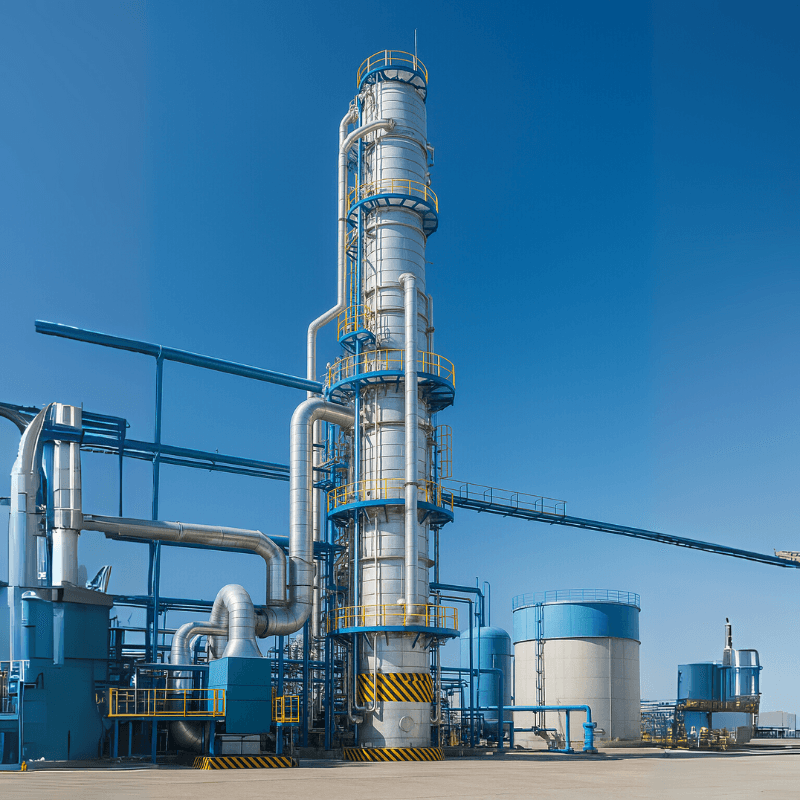Plate Type Falling Film Evaporator (PTFFE)
A Plate Type Falling Film Evaporator (PTFFE) is a compact, modular and highly energy-efficient heat exchange system accommodated in minimum footprint area and widely used for concentrating liquids in industries such as sugar, food processing, chemicals, wastewater etc.
When integrated with Mechanical Vapor Recompression (MVR), PTFFEs significantly reduce energy consumption and operational costs by enabling evaporation at minimal temperature differences often as low as 1°C.


Working Principle
Feed Distribution
Heat Transfer
Evaporation Terminology
MVR Integration
Why Choose MVR-based LTE®?
Highly Energy Efficient
Operates with minimal temperature difference (~1°C), significantly lowering steam consumption.
Compact Footprint
Achieves a large heating surface area within a minimal footprint, and is further scalable, reducing space and structural requirements for installation.
Short Residence Time
Minimizes heat exposure for sensitive liquids, preserving product quality.
Easy Installation
Easy transport and quick assembly with a compact, self-supported design that requires minimal civil work, structure, and erection time.
Automated Control
Advanced automation enables complete equipment control, preventive maintenance alarms, and enhanced safety measures, including CIP (Cleaning-In-Place), from the DCS (Distributed Control System) with no manual intervention.
24x7 Remote Operational Support
Continuous online monitoring, assistance, and control to ensure uninterrupted performance, quick troubleshooting, and optimal operation of equipment from anywhere.
Highly Energy Efficient
Operates with minimal temperature difference (~1°C), significantly lowering steam consumption.
Easy Installation
Easy transport and quick assembly with a compact, self-supported design that requires minimal civil work, structure, and erection time.
Compact Footprint
Achieves a large heating surface area within a minimal footprint, and is further scalable, reducing space and structural requirements for installation.
Automated Control
Advanced automation enables complete equipment control, preventive maintenance alarms, and enhanced safety measures, including CIP (Cleaning-In-Place), from the DCS (Distributed Control System) with no manual intervention.
Short Residence Time
Minimizes heat exposure for sensitive liquids, preserving product quality.
24x7 Remote Operational Support
Continuous online monitoring, assistance, and control to ensure uninterrupted performance, quick troubleshooting, and optimal operation of equipment from anywhere.
Salient Features
Up to 3x higher Heat Transfer Coefficient (HTC) compared to traditional tubular falling film evaporators.
Multi-effects can be accommodated in a single modular shell, simplifying design and reducing piping complexity.
Specially pressed and welded plate packs offer superior durability and thermal performance.
For challenging liquids, a wide range of material options - such as SS304, SS316, and Titanium - are available to ensure compatibility and durability.
Ideal for greenfield and brownfield projects looking to boost profitability through energy optimization.

Applications Across Industries
SED’s PTFFE delivers reliable, energy-efficient evaporation for a variety of sectors:
Sugar & Distillery
Food & Dairy
Chemical Processes
Wastewater Treatment
Bio-based & Green Chemistry
Why Partner with SED?
SED combines innovation with reliability. Our PTFFE solutions are engineered not just as products, but as long-term collaborations to:
- Reduce energy intensity and operational costs
- Increase throughput and process sustainability
- Modernize plants with modular, future-ready design
Frequently Asked Questions
Revolutionizing Efficiency. Redefining Standards.
Step into the future of evaporation with SED’s Plate Type Falling Film Evaporator — engineered for energy savings, operational reliability, and sustainable performance.
